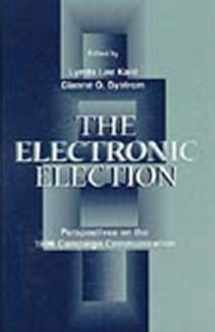
The Electronic Election: Perspectives on the 1996 Campaign Communication (Routledge Communication Series)
ISBN-13:
9780805827798
ISBN-10:
080582779X
Edition:
1
Author:
Lynda Lee Kaid, Dianne Bystrom
Publication date:
1998
Publisher:
Routledge
Format:
Hardcover
440 pages
FREE US shipping
on ALL non-marketplace orders
Marketplace
from $6.03
USD
Marketplace offers
Seller
Condition
Note
Seller
Condition
Used - Very Good
Book details
ISBN-13:
9780805827798
ISBN-10:
080582779X
Edition:
1
Author:
Lynda Lee Kaid, Dianne Bystrom
Publication date:
1998
Publisher:
Routledge
Format:
Hardcover
440 pages
Summary
The Electronic Election: Perspectives on the 1996 Campaign Communication (Routledge Communication Series) (ISBN-13: 9780805827798 and ISBN-10: 080582779X), written by authors
Lynda Lee Kaid, Dianne Bystrom, was published by Routledge in 1998.
With an overall rating of 3.8 stars, it's a notable title among other
books. You can easily purchase or rent The Electronic Election: Perspectives on the 1996 Campaign Communication (Routledge Communication Series) (Hardcover) from BooksRun,
along with many other new and used
books
and textbooks.
And, if you're looking to sell your copy, our current buyback offer is $0.5.
Description
In this volume, editors Kaid and Bystrom assembled a unique collection of research and analysis focused on the electronic communication in the context of the 1996 political campaign. The contributions included here represent both candidate-controlled communication, such as political advertising, convention appearances, and internet sites, as well as media communication through news and debates that are not under the control of the candidate. Part I, The Battle to Control Campaign Messages, focuses on the campaign messages transmitted to voters through the electronic media, and Part II, Messages From Candidates and Voters, contains discussions of the political advertising messages at the presidential level and in major statewide races. Among the significant research results included here are details on the role of women candidates and new perspectives on the antecedents of voter cynicism and the parts that various communication formats play in voter disengagement. Overall, this volume provides a rich variety of theoretical and methodological approaches to election communication and offers valuable insight into the communication interaction between voters, candidates, and the mass media in the 1996 campaigns. As such, The Electronic Election represents a thorough analysis of the current state of campaign communication for scholars and students in all areas of political study.


We would LOVE it if you could help us and other readers by reviewing the book
Book review

Congratulations! We have received your book review.
{user}
{createdAt}
by {truncated_author}


